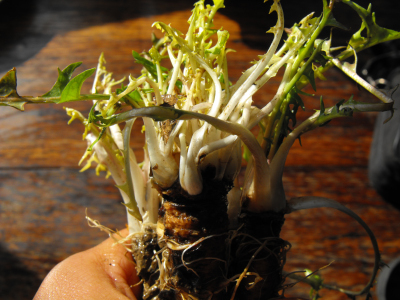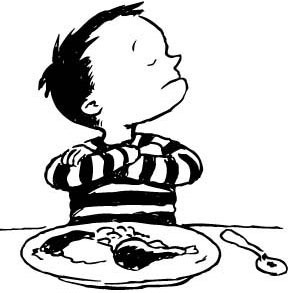
Pros and cons of perennial vegetables
 Before
I delve right into the most intriguing
plants from Eric Toensmeier's Perennial Vegetables, it's
worth taking a minute to see if perennial vegetables are right for
you. The advantages are intriguing. Since you don't have to
plant them every year, perennial vegetables are low maintenance and
work very well with no-till systems, building soil quality with their
decaying leaves. Some are shade tolerant, which is seldom true
with annual vegetables, so you can slide these perennials into out of
the way spots in your garden. Even more intriguing, perennial
vegetables
extend the harvest season, often providing food when your annual
vegetable garden is at its worst. I was won over this March when
I wandered out into the yard and picked
some mulch-blanched dandelion greens long before any of our
annual
greens were ready to eat --- who wouldn't want delicious food that they
hadn't worked for when no other fresh food is available?
Before
I delve right into the most intriguing
plants from Eric Toensmeier's Perennial Vegetables, it's
worth taking a minute to see if perennial vegetables are right for
you. The advantages are intriguing. Since you don't have to
plant them every year, perennial vegetables are low maintenance and
work very well with no-till systems, building soil quality with their
decaying leaves. Some are shade tolerant, which is seldom true
with annual vegetables, so you can slide these perennials into out of
the way spots in your garden. Even more intriguing, perennial
vegetables
extend the harvest season, often providing food when your annual
vegetable garden is at its worst. I was won over this March when
I wandered out into the yard and picked
some mulch-blanched dandelion greens long before any of our
annual
greens were ready to eat --- who wouldn't want delicious food that they
hadn't worked for when no other fresh food is available?
 As a certified picky eater,
the answer could
be "me." Toensmeier is very realistic about the potential of
perennial vegetables, and goes so far as to explain that many perennial
vegetables are too strong-flavored to be a mainstay of the diet.
Perennial greens are usually at their best just when I picked my March
dandelions (which were scrumptious, by the way), but later in the year
after the perennials bloom, you'd be much better off eating swiss chard
out of your annual garden. Another disadvantage is that many
perennial vegetables take years to establish, just like asparagus or
fruit trees, and since you can't rotate perennials through your garden,
viral diseases can build up and wipe out your crop. Other
perennials are altogether too tenacious, turning into weeds in your
garden, and non-vegetable weeds can be yet another problem among your
perennials if you're not adept at creating weed-free no-till beds.
As a certified picky eater,
the answer could
be "me." Toensmeier is very realistic about the potential of
perennial vegetables, and goes so far as to explain that many perennial
vegetables are too strong-flavored to be a mainstay of the diet.
Perennial greens are usually at their best just when I picked my March
dandelions (which were scrumptious, by the way), but later in the year
after the perennials bloom, you'd be much better off eating swiss chard
out of your annual garden. Another disadvantage is that many
perennial vegetables take years to establish, just like asparagus or
fruit trees, and since you can't rotate perennials through your garden,
viral diseases can build up and wipe out your crop. Other
perennials are altogether too tenacious, turning into weeds in your
garden, and non-vegetable weeds can be yet another problem among your
perennials if you're not adept at creating weed-free no-till beds.
The conclusion that I
came to is that perennial vegetables are really a
complement to your annual vegetable garden, not a replacement. If
you're happy with the amount of work you're putting in and with the
year-round output of your vegetable garden in a certain area (like
tubers for us), you might decide to forego perennial vegetables
in that category. But if you've had problems with making your
annual crops produce in a certain category (like storage onions) or
provide fresh food all year (like greens), there's almost certainly a
perennial vegetable that can be slid in to fill that niche.
| This post is part of our Perennial Vegetables lunchtime series.
Read all of the entries: |
Want more in-depth information? Browse through our books.
Or explore more posts by date or by subject.
About us: Anna Hess and Mark Hamilton spent over a decade living self-sufficiently in the mountains of Virginia before moving north to start over from scratch in the foothills of Ohio. They've experimented with permaculture, no-till gardening, trailersteading, home-based microbusinesses and much more, writing about their adventures in both blogs and books.
Want to be notified when new comments are posted on this page? Click on the RSS button after you add a comment to subscribe to the comment feed, or simply check the box beside "email replies to me" while writing your comment.

I have been OBSESSED by Toensmeier's book since I ordered it on a whim this past fall. I love the perennials that I already have (fruit, mint and asparagus) and want to add more. In fact, I am expanding my garden beds just to make room. I always like to have a back-up plan for doing things (i.e. if my stove stops working, I can cook on my wood stove). The perennials are my back-up plan to my nascent seed-saving project. I also like the fact that so many of them are flowers (musk mallow, yellow asphodel, etc).
I found that the best thing to do is go through the book with sticky notes and mark the ones that will work in your part of the country. There's a surprising number that work in Appalachian North Carolina where I live. Then go through and figure out what will work on your land; I eliminated most of the wet-soil crops like fuki and udo, which sound like they would love your soggy valley.
One problem I had was tracking down some of the more exotic veggies. The root crops seem to be hardest to find, like potatoes, and they're the most expensive, too. (A quarter of my seed budget. Yikes!) I hunted online and found that the best sources for exotics were Oikos Tree Crops, Mapple Farms and JL Hudson Seeds. They have some of the rarer things like Chinese Yam and Chinese Artichoke.
The leafier things that you can start from seed are easier to find, and they cost a LOT less. This includes lovage, chicory, scorzonera, etc. Pinetree Gardens and Fedco seemed to be the cheapest sources.
I never did find a decent-looking skirret clone for sale. Toensmeier seems to have a semi-secret website called Perennial Pleasures, which he uses to distribute perennials to people in Massachusetts. I have written to him asking if he can ship his skirret down to NC, but I haven't gotten an answer yet, just an auto-reply that says he's taking the winter off and will be back this spring.